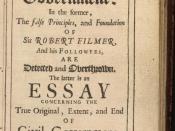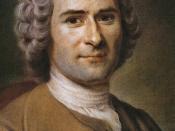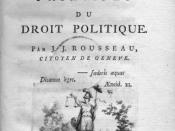The significance of reason is discussed both in John Locke's, The Second Treatise of Civil Government, and in Jean-Jacques Rousseau's, Emile. However, the definitions that both authors give to the word "reason" vary significantly. I will now attempt to compare the different meanings that each man considered to be the accurate definition of reason.
John Locke believed that the state "all men are naturally in ... is a state of perfect freedom" (122), a state in which they live "without ... depending upon the will of any other man" (122). It is called the "the state of nature," and it is something that is within us at birth. The state of nature is a law made by God, called the Law of Reason. This law gives humankind liberty, freedom, and equality and stresses that no man "ought to harm another in his life, liberty, or possessions" (123).
According to Locke, the law of reason is the basis of man as well as society. It restrains men from infringing on the rights of others. In this state, there is no need for a central authority figure to govern the actions of people, for it is the people, themselves, who impose the "peace and preservation of mankind" (124). One can have perfect freedom as long as one does not disturb others in their state of nature; in this "state of perfect equality ... there is no superiority or jurisdiction of one over another" (124). Men, thereby, have the power to "preserve the innocent and restrain offenders" (124) and punish those who transgress against them and disturb their "state of nature." Thus, all men are their own "executioner[s] in the law of nature," or the Law of Reason.
While all men are in charge of their...


